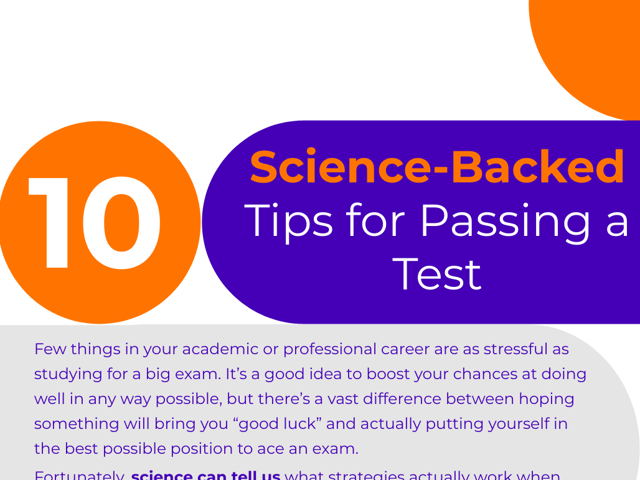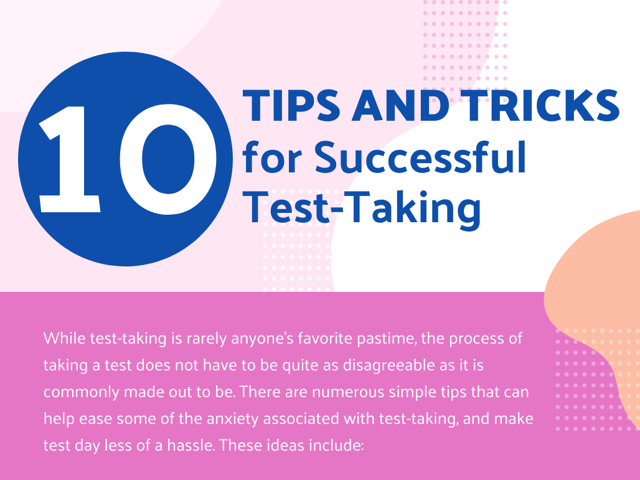
Ten Science-Backed Tips for Passing a Test
Few things in your academic or professional career are as stressful as studying for a big exam. It’s a good idea to boost your chances at doing well in any way possible, but there’s a vast difference between hoping something will bring you “good luck” and actually putting yourself in the best possible position to ace an exam.
Fortunately, science can tell us what strategies actually work when prepping for the test. From research, we give you these ten solid suggestions:
1. Study every day
Forget cramming for a big test; it simply doesn’t work. But studying even a little bit of the material every day for at least a week prior to the test can help you solidify foundational concepts and identify weak areas in your knowledge. You can then pinpoint what you need to spend more time studying.
2. Eliminate distractions
Distractions make it harder for you to commit facts to memory. If you truly want to make the most of your study time, turn your phone, TV, and music off, and make sure you are in a location where you won’t be disturbed.
3. Take exercise breaks
Engaging in physical activity, particularly cardio, serves to improve your memory—even if it’s just a 20-minute session. It also increases your energy level and can counteract the effects of stress, all of which contribute to an improved mental state.
4. Fill your tank with the good stuff
A hungry belly is a distracted belly. This tenet is true when studying or when taking an exam. But the composition of your diet can also enhance your ability to focus and think quickly. Test-taking abilities are enhanced when participants eat a high-carb, high-fiber diet of slow-digesting foods, such as oatmeal. Healthy snacks such as nuts, fruit, and yogurt are essential too.
5. Develop your own study materials
Rather than relying on teacher handouts and highlighted passages, develop your own flashcards, outlines, or other study materials. This helps you commit the material to your memory.
6. Practice, practice, practice
Reviewing study aids, books, and other materials is important, but the best way to prepare for an exam is to practice taking it. Often, you can find practice tests online, or make them yourself.
7. Be present
Skipping classes puts you at an automatic disadvantage. Attending class every day (especially during the week prior to an exam) is crucial for knowing what material will be on the test and any other vital information. If an absence is unavoidable, be sure to touch base with the instructor to cover any information you may have missed.
8. Study in new locations
If you’re running to the library, or another favored location, every time you need to study, you may be training your brain to shut down. Human brains associate learning with the background sensations present during the time. When you alternate your study spots, you retain information better.
9. Get a good night’s rest
While there is a long-held belief that pulling an all-nighter to prepare for an exam can boost results, the reality is that a lack of sleep can impair your reasoning and memory skills for up to four days! Further, you deprive your body of REM sleep, which aids in memory formation. Getting a solid night of rest will do far more to improve your performance than an all-nighter ever could.
10. Review on exam day.
If you have some time to take a quick peek at the material prior to walking into the classroom, it can definitely help freshen up your memory and recall it to the forefront of your mind.
An optimal studying process may vary a bit for different individuals but, rather than wasting time on old wives’ tales and other supposed tricks that might work, it’s worth taking some time to do the things on this list to gain an advantage on your next test. After all, the data shows that these methods actually work!
And if you’re preparing for a particular standardized test, we may be able to help you even more. Union Test Prep offers FREE practice materials for over 40 popular tests and we’re adding more tests all the time. Check us out!

Keep Reading

Union Test Prep Blog
It’s Almost Test Day—What Should I Do?
You’re approaching the day of your test, and it’s time to take care of …

Union Test Prep Blog
What Are Holistic Admissions?
The term “holistic admissions” alternately garners horrified eye rolls …

Union Test Prep Blog
Ten Tips and Tricks for Successful Test-Taking
While test-taking is rarely anyone’s favorite pastime, the process of t…